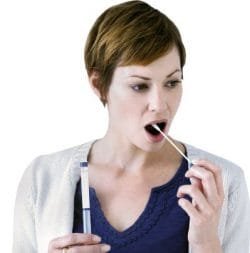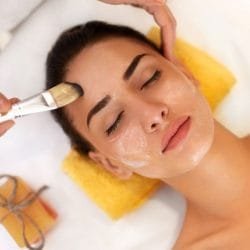

Last year, June 2018, our very own Dr. Teo Wan Lin was invited by Lianhe Zaobao, a Chinese newspaper, to do an interview about the rise of DNA analysis in skincare. But before anything else, what exactly is this DNA analysis that many people want to incorporate with their skincare regime? For the information and awareness of the majority, let’s discuss about the said kit.
Several home DNA kits and beauty DNA kits have been released to the public via online shops, TV shopping channels, and even in the market which claims to provide detailed family history and wellness reports based on your genetics. I mean we get it that pregnancy test kits work, but most of the time it is also not really reliable. (comparing it since the concepts are quite similar)
These DNA kits have gotten really popular and mainstream that many people want to try it because apparently, these kits are your source to having a personalised and customised skincare.
Apparently, it claims to be able to help in explaining how your skin and hair look, feel, and react to various conditions and tell at approximately what age you most likely would have wrinkles, fine lines, when your skin will stop producing collagen, and basically every beauty problem that may arise with aging.
We heard these points and claims from the companies that manufacture and distribute these products, but what about from a dermatologist? From a doctor’s side and point of view, does it really work? And is it reliable and effective?
Dr. Teo Wan Lin on home DNA kits and analysis in skincare

According to our very own Dr. Teo Wan Lin, MBBS, MRCS, home DNA test kits are not recognised or marketed by medical specialists because of the lack of evidence backing up the accuracy of such tests. Personally for her as a dermatologist, she does not recommend using any of these methods for diagnosis of one’s skin condition. Firstly, such skin tests are not validated by dermatologists in larger clinical settings and the results can be misleading and potentially dangerous for lay persons to rely on to diagnose their skin problems.
Well, truthfully speaking, admit it or not, as you are reading this, simply ask yourself how can a simple DNA kit analyse and tell about your skin concerns to treat?! Because it is of common sense that to know what underlying skin concerns you are trying to target, we use our sense of sight. Dermatologists rely on visual inspection and clinical diagnostic tools to diagnose skin diseases and photoageing, which is based on clinical experience and training. Specific gene testing can be done in research settings but mostly for genetic diseases of the skin, and is performed by accredited laboratories either in Singapore or overseas. This does not apply for the kind of home DNA test kits that is presently being marketed.
We asked Dr. Teo if she has personally taken a DNA analysis to learn about her skin traits and if she finds it insightful. Her response –
“I personally do not find it useful to take a DNA analysis. I would imagine that these tests would be accurate to a certain extent but it would truly be determined by data that is gathered from your own demographics, for example your age, the type of racial background you are of or ethnicity – these are very common demographic features which do help determine how your skin ages. Beyond that, based on what we see in these home DNA test kits as they are now, would be just very generic comments, on the amount of moisture, the elasticity, pigmentation on your skin and that’s something we expect to be age appropriate. If you are 50 years old versus you being 30 or 20, I think there would be meaningful differences in your skin quality, just simply based on your age alone. I do not think knowing this generic information with DNA analysis is useful in terms of how you should treat your skin.
In any case, we do know that healthy skin all have the same requirements. For example, if you actually have a skin disease, such as skin sensitivity, which is actually a form of facial eczema that needs to be first diagnosed by an accredited specialist and treated with medications in order to improve skin health. In addition, one who is knowledgeable in the area of skincare and healthy skin should already get started at an early age on cosmeceuticals which are recommended by dermatologists. To maintain skin health, it is also much more useful to take preventive measures, such as with sun protection – a proper medical grade sunblock, sun avoidance measures, implement lifestyle changes such as a good diet with regular exercise, avoid smoking and get started on cosmeceuticals as recommended by a dermatologist. At the end of the day, the most useful piece of advice I would give is if you have a skin issue or a concern on the health of your skin, it is best to visit an accredited dermatologist instead of attempting to DIY with home DNA test kits.”
With that being said, I guess it pretty much sums up about how DNA analysis may not be useful in terms of customising your own skincare regime. Let’s just leave this entire DNA testing procedure for maternity and paternity tests.
REFERENCES:
Dr. Wanlin Teo, MBBS (S’pore), MRCS (Edin)
Founder and Medical Director TWL Specialist Skin and Laser Centre
Co-founder Dr. TWL Dermaceuticals
What Are Beauty DNA Kits, And Why Are They Popping Up Everywhere?
https://www.huffpost.com/
I Got DNA Tested to Determine My Skin Care Regimen
https://www.elle.com/
